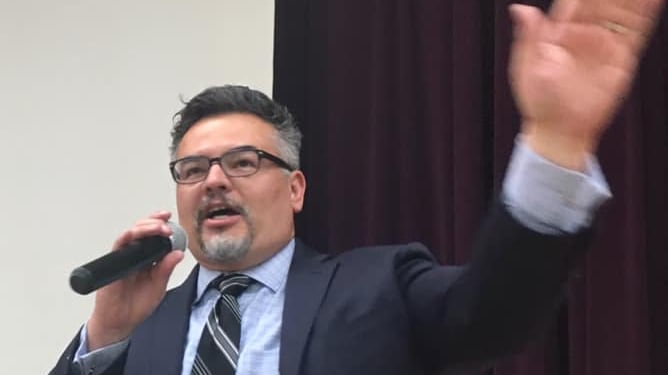Secretary of State Dennis Richardson delivered on a campaign promise today, producing a 92-page audit of Portland Public Schools and the Oregon Department of Education.
The audit is unusual in a couple of respects: first, the secretary of state does not usually audit local governments; and second, the secretary of state doesn't often combine two agencies in the same audit.
But actually, the choice makes sense. K-12 education is the state's single largest expenditure and PPS is the state's largest district, serving 48,650 students.
Add to those facts the disclosure in the audit that PPS did not until recently employ a single internal auditor (it is now hiring two) despite having a general fund budget of $655 million, and it's obvious why Richardson would want his auditors to take a look.
Although PPS and ODE generally agreed with the audit's findings, PPS officials referred to the audit as a "political request by the Secretary of State" (Richardson is a Republican) and were so anxious to convey the message that they've already made major changes, they took the remarkable step of holding a press briefing even before the audit was released.
Here are key takeaways from the audit, and PPS' response:
Portland teachers miss a lot of school. "Absences averaged three weeks for teachers and more than four weeks for assistants, not counting holidays
and scheduled breaks. PPS's per student costs for licensed average cost for the next three largest districts in Oregon," the audit found.
The district did not push back. "The Superintendent had already identified this as an issue of concern," the district said in a written response to the audit. "PPS will take a critical look at the factors that contribute to teacher absenteeism and high substitute teacher costs."
"This is an issue that we are working on," adds PPS spokesman Harry Esteve. "It's critical for our students to have consistency, and it is our job to ensure our teachers have a high level of support, professional development and working conditions regardless of where they are teaching."
Principals turnover is a big problem: "PPS has not prioritized reducing principal turnover at high-poverty schools,despite the importance of principal stability for student achievement. Over the last five years (2013-14 through 2017-18), both Title I schools and non–Title I schools at PPS averaged two principal," the audit found. In its response, the district agreed it had fallen short.
"Until recently, PPS had very weak practices in hiring, coaching, and monitoring principals," the district responded. "In addition, there seemed to be a common past practice of regularly rotating principals in Title I schools, interfering with their ability to form relationships and establish a strong and supportive school climate."
Esteve says the district is focused on helping principals succeed.
"We are devoting more time and resources to supporting all of our principals," he says. We have monthly professional development institutes for principals focused on improvement science, and we have reorganized our Office of School Performance to ensure that we have more central office staff spending time in schools supporting principals."
The district doesn't manage contracts effectively: One of the areas auditors evaluate was whether PPS monitored contracts. Auditors selected 18 contracts for analysis. The results weren't good. "Overall, 11 of the contracts we reviewed did not clearly establish performance metrics in either the contract itself or the scope of work. For 14 contracts, we had difficulty documenting that a
district contract manager evaluated or worked to improve the contractor's performance, including a manager of contracts governing third-grade reading improvement, one of the district's top goals."
While PPS agreed it could tighten contracting procedures, the district accused auditors of cherry-picking.
"The auditors hand-picked contracts for review versus randomly selecting contracts, so the observations and recommendations are not necessarily applicable to all of the other PPS contracts," the district said in its response.
PPS spends a lot of money but it doesn't sufficiently tie that spending to goals or outcomes: PPS spends far more per student than any other large Oregon district except for one, the audit found. It also spends considerably more per student than many peer districts around the country. Yet, its results, except with students who are white and middle class don't reflect sound strategic spending.
"PPS's budget includes limited program detail, few performance measures, no benchmarking against other districts, little detail on changes in staffing and spending over time, and no information on results from high-priority programs," the audit says.
All of the above leads to poor results for students of color: PPS spends far more per student than any other large Oregon district except for one. It also spends considerably more per student than many peer districts around the country.
"The district's white students scored higher than comparable students statewide, while African-American, Pacific Islander, and economically disadvantaged students scored lower than students statewide. Latino students scored at the state average," the audit found.
The gap between white and black students is particularly large—53 percent across all grades in language arts on 2017-18 state tests.
Esteve says PPS is committed to helping under-served students improve their performance. "We are devoting more resources, including additional education staff, counselors, and mental health professionals to closing the racial opportunity and achievement gap," he says.
In their response to the audit—itself 27 pages long—board and district leaders said PPS is heading strongly in the right direction.
"Many of the reforms outlined in the recommendations are already underway," said the district response. "The Board of Education, which has experienced a complete turnover in membership since 2015, hired a new Superintendent who started in October 2017, and together we have embarked on significant, comprehensive, and transformative work."
As for ODE, the beleagured agency took a beating in its portion of the audit for being unfocused.
"Oregon's education improvement efforts are splintered and lack a coherent strategy," the audit found. ODE didn't disagree.

